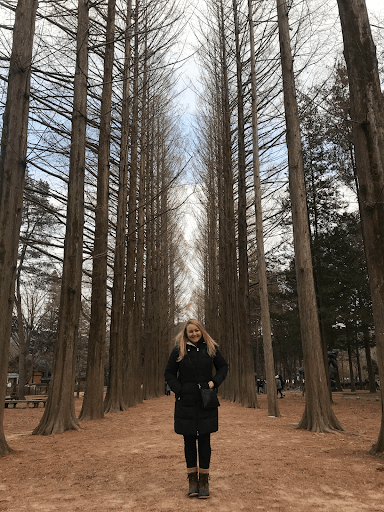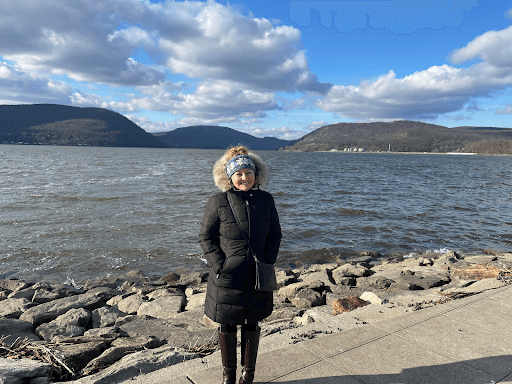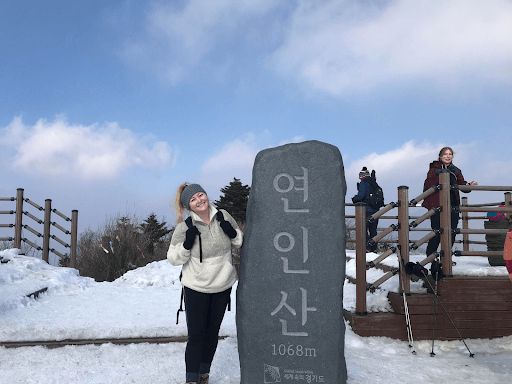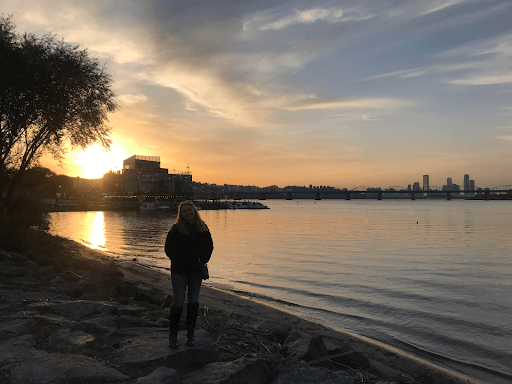Get ready for an exciting read as we introduce you to Amelia Hoffmann. Amelia is a globetrotting SLP who has worked as an SLP abroad in South Korea. If you’ve ever dreamed of practicing speech therapy in a foreign country, then you can’t miss her inspiring story.
Tell us about you. Where are you initially from and what made you become an SLP?
I grew up in sunny Florida and earned a bachelor’s in business with the intent to use it in any way possible to travel. This was my main goal at the time after having been bitten by the travel bug early on.
Following earning a marketing degree, I packed my bags and moved to Thailand to teach English as a foreign language in a suburb just outside of Bangkok. I loved living and working in a different country. I found myself enjoying my small tutoring groups the most! Shortly after, I was teaching English at a summer camp in Italy when a coworker told me all about her graduate program for communication sciences. I was hooked. It appeared to be a field that linked my love of working with kids and language, as well as serving smaller groups of children.
Additionally, after some research, I discovered there were opportunities for travel involved. I packed my bags again, procured a job online teaching English as a foreign language, moved back to the states, and started working my way through graduate school.

Where did you go to SLP school and when did you graduate?
I attended the University of Central Florida in Orlando. I had an extra year of prerequisites since my bachelor’s was unrelated to communication sciences and disorders, so I graduated in December 2018 with my MA in CSD.
What did you do for your CF and how was that experience?
My CF was completed in the school setting. It was a year of learning, making mistakes, refining time management skills, navigating paperwork, and adjusting to group therapy.
Did you work any travel therapy SLP jobs in the United States?
You bet!
During grad school, I scoured the internet for SLP travel opportunities. I stumbled upon some SLPs who were working internationally in schools in Indonesia and Singapore, and I reached out to them on LinkedIn. They advised me to complete my CF prior to applying for international school positions.
I am relieved that I listened as I did not have previous school experience, and the deadlines, policies, processes, and paperwork can be overwhelming for those who have no experience with it. Additionally, I was still developing my clinical and workload management skills.
It was around this time that I came across The Traveling Traveler blog and discovered domestic travel therapy. I figured that I could complete my CF while also exploring the country. While I considered Las Vegas, Memphis, and Washington DC to complete my CF and begin my travel therapy journey, settling on the latter. I ended up loving the DC area, and it is one of the best decisions I could have made.

What inspired you to apply for a position abroad?
I had loved living and working in different countries in my prior experiences and knew that if an opportunity to do so again arose within the field that I was passionate about, it would be a perfect match. I finished my CF in December 2019 and knew that I would finish the school year and begin applying for DODea and international school positions. It was not too long after earning my CF that Covid-19 forced schools to shut down. It was not an ideal time to venture into international school territory.
Where are you working now as an SLP abroad and how long have you been in that position?
Fast forward to 2022! The impacts of and precautions for Covid-19 were finally clearing and the world was open for international travel again. I am now working at an international school in South Korea, just outside of Seoul.
How have your family and friends reacted to you leaving the United States to work abroad as an SLP?
I don’t think it came as a surprise to anyone since I have previously lived abroad and have always been very open about those goals. Everyone has been incredibly supportive, and I’m even looking forward to having my parents visit soon. I miss my friends and family, but the community here is welcoming and the Korean bbq makes up for a lot!
Did you apply for multiple different SLP international jobs? If so, what made you decide to work as an SLP in South Korea?
For many countries, the field of speech-language pathology is relatively new. In fact, in some countries, it does not yet exist! There are only so many international schools, and there are only so many international schools that are large enough to have an SLP and provide learning support. While there is little competition for SLP jobs in international schools, the jobs themselves can be few and far between. In 2021, an international school in Bangkok offered me a position. However, due to COVID precautions, there was a high probability that I would be working from my apartment for the school year. I was not enthusiastic about this prospect, especially since I had just emerged from lockdowns in the states. I had to keep my eyes peeled and check job boards frequently.
That said, I did apply for other positions. The following school year I applied for a job in Shanghai and in Seoul. I opted for Seoul after extensive research on ex-pat life in South Korea and the school itself.

Where did you apply for this SLP international job and how was the application process?
I utilized Schrole, but another commonly used platform for international school positions is Search Associates. Both are the standard for “top tier” schools and well-established schools. You could also do a targeted search for schools and apply to them directly, or check out sites like tieonline. There are Facebook groups for ex-pat SLPs as well.
The application process was extensive. It is expensive for schools to fly you across the world, pay for your move, and for you to live there. So, they want to ensure that when you arrive, that you are likely to stay and be a good fit for the school. I went through three rounds of interviews for each That was following all of the preliminaries like CVs, cover letters, references, and a thorough profile on EduSchrole.
The work didn’t end there! Once the contract was signed, I got to work on visa processes with the help of the school.
Did you have to get special licensure to work as an SLP in South Korea? Are you ASHA certified?
Yes, I am ASHA certified. Per ASHA, to work in another country, you must meet that country’s visa, work permit, education, licensing, and regulatory requirements. I meet those requirements for South Korea. It all depends on the country, so it is important to do your research! The Special Education Network Inclusion Association (SENIA) is a great resource when searching for positions in Asia.
How do the pay rate and cost of living compare to working and living in the United States?
Typically, and in my case as well, the benefit packages are exemplary, especially in areas like the Middle East or Asia. I am currently making less per paycheck than I was in DC, but am saving exponentially more.
My beautiful accommodation is paid for, the cost of living is lower than it was back home, and transport is cheap. The school pays for flights back and forth after the contract end, as well as shipping costs. My only bills end up being my internet, utilities, and my phone bill, which are all super reasonable. I anticipate that I will have easily saved two-thirds of my overall take-home pay. This is while still going out to eat two or three times a week, buying lunch every day at school, and exploring and traveling on the weekends/holidays. International schools are known for having generous packages, so it is important to look not at the dollar amount being paid, but at the savings potential.
What are your expenses like as an SLP abroad?
As for the cost of living, my biggest expense, rent, is taken care of right off the bat. Being just outside Seoul, costs are slightly lower than they would be in the heart of the city. Just like you would do anywhere you live, you learn where to shop locally to get the most bang for your buck and take transport options that make the most sense.
It is an easy city to live in without a vehicle, but many of my colleagues have cars and they report it as being very affordable. Going out to eat is cheaper here, particularly when eating Korean cuisine. For example, I have paid $35-40 for Korean bbq and drinks in Northern Virginia, and for the same amount of food and drinks, it would be $25-30. Local hole-in-the-wall places in can be as low as $15! A burrito in the DC area costs anywhere from $8-12, whereas, in my favorite neighborhood spot, burritos cost $5-6.
What are your favorite things about working as an SLP at an international school in South Korea?
My favorite thing about working in an international school is the flexibility and creativity that is allowed. For example, in my previous state and county, there were laws about how an SLP could operate within the school. In the US, there was a lot of red tape to jump through to get processes started.
In an international school, not being bound by the same laws, it is easier to implement Tier I and II approaches. I can experiment with various intervention models to see which is most beneficial for students on my caseload.
Secondly, my caseload was climbing up towards 60 back home, and it hovers around 20 – 25 here, so I have more time to see students, use groups if it is helpful to the student but not out of necessity, and I can devote a large portion of my time to teacher support.

What are the biggest challenges of working abroad as an SLP?
If you have worked in a school setting, you may have heard of speech island, where you are the only SLP at a school. It’s important to have a great support system and find ways to link with other SLPs, even just to bounce ideas off of each other. Here, that island is even more distant as there are only so many international schools in a country and only so many SLPs within that international school pool.
It is important to have a good handle on your position, skills, and responsibilities because you may be the only SLP in the country, let alone city. There are a few SLPs scattered about in Seoul, so I’m certainly not alone. However, on a daily basis, I am the only one with my particular skill set in the building and area.
What cultural differences have you noticed between working as an SLP in South Korea and working in the United States?
A good portion of the students at my school, whether or not they are Korean, have lived in Korea for years. I have noticed that students are incredibly polite, respectful, and hardworking. There appear to be far fewer behavior plans written and attitudes toward learning are more favorable. I am often thanked after a speech session by students and parents are truly grateful for the help. Part of this has to do with being at an international school in itself. The other is the respect that is associated with education in South Korea.
Is the language barrier an issue for your work? Do you know Korean?
Native English speakers who are fully certified teachers teach American, British, or Canadian curriculums at international schools in English. Although I am not fluent in Korean, it’s not surprising since many students at the school have exposure to multiple languages and are bilingual or multilingual, including English.
Because of these language influences, it can be difficult to parse out the difference between language differences and disorders. But that is also one of my favorite challenges about working in this environment. EAL teachers, learning support teachers, the school psychologist, and myself all work closely, just as we would in the US, to support students with the tools and services that they require. Students still must qualify with a communication disorder to receive speech services in a Learning Support Plan, just as they similarly would in the US.
What 1 thing would you love to change about your position?
Truly, I do not think there is anything that I would change. I am lucky that I have the autonomy to adjust the manner in which I provide services as I see fit. As long as I am, of course, meeting students’ needs and following Learning Support Plans.
How do you spend your time when you’re not working?
When I am not working, I am usually eating, exploring, exercising, or socializing. I enjoy going to food markets to try many famous dishes and tried countless restaurants within my neighborhood. I also go into Seoul to try any cuisine one could imagine.
On weeknights, I usually relax or exercise, or participate in social activities with colleagues, ex-pats, and locals. MeetUps have been wonderful for meeting locals for language exchanges, meeting other hikers, and finding fun excursions.
On the weekends, I explore Seoul, hike in the nearby mountains, or join fun tours like Soju tastings or skincare classes. On my weekends I am on vacation in a different country. Seoul boasts exceptional nightlife, food culture, and beautiful outdoor opportunities, and I do my best to take advantage of those.
What advice would you give SLPs or future SLPs who want to work abroad?
My first piece of advice would be to take the leap!
There are so many pros associated with living and working abroad that they far outweigh any cons in my opinion. Next, I would encourage them to ensure they have experience working in schools and with students of multiculturally diverse and linguistically diverse populations. I am glad that I was able to gain ample experience with those populations prior to my arrival here. I would advise SLPs to be confident and competent with assessment in that area as well.
Last, I’d advise them to explore a variety of avenues like DODea, international schools, and international private practices. Utilize the Mutual Recognition Act, or participate in international volunteer experiences. If your heart is set on a certain country, try performing targeted searches. The more open-minded you are to various areas, the more opportunities there will be.
Can SLPs contact you for more information? How can they contact you?
I can be contacted at SLP@speechsoundsolutions.com, or via my website at www.speechsoundsolutions.com.
Anything else you want to share with us that we haven’t talked about already?
Just a huge thanks to Julia for providing a platform to help the SLPs with travel bugs learn about their options. And, for guiding me through the domestic travel therapy process via your website back when I was searching. Thank you for allowing me to share my story. I hope that the information is helpful to readers considering working overseas.
Free E-Book & Newsletter
Subscribe to get our latest content and stay up to date by email

Great article! I’m in the middle of my 16th consecutive year working abroad as an SLP in international schools. I can confirm all of what is said here and recommend pretty much the same advice!
Thanks for the positive feedback! This means a lot since you have so much experience abroad. Congrats on 16 years.
Hello,
I retired from my school-based SLP position 3 years ago. I am visiting my son in Japan and ‘mentally’ exploring options tied to working again, this time abroad. Thanks for sharing your experience!